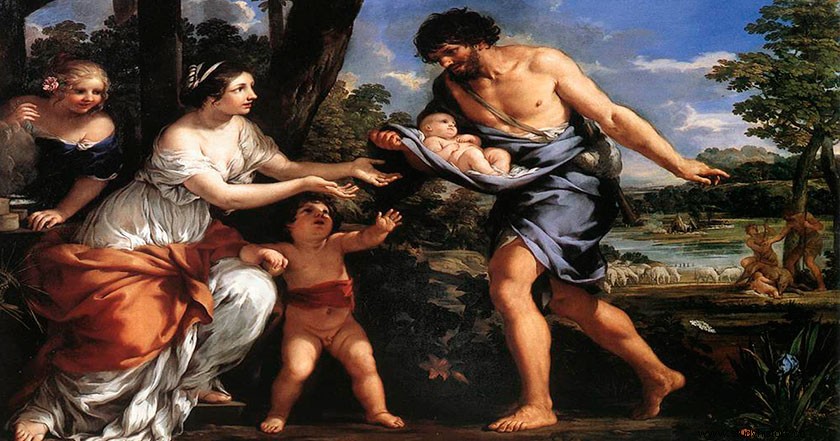
Today, September 4, 2018, is celebrated by first time of the “Day of Romanity”. I invite you to learn more about this act at the following link:diadelaromanidad.com
An act that aims to vindicate the common past of millions of people from three continents, Europe, Asia and Africa. From Walking Through History we can only celebrate this decision, at a time when it seems that every day we forget a little more how much the Mediterranean united us, giving greater weight, unfortunately, to what came after the fateful year 476 AD.
What better occasion than this, to get closer once again to the mythical foundation of Rome under those seven hills, which occurred more than a millennium before Odoacer, the king of the Heruli, deposed Romulus Augustulus the last emperor of Rome. By the way, what a coincidence that the latter bears the same name as the supposed founder of the city.
Before entering fully into mythology, we must look at archeology even out of the corner of our eyes. Around the year 1000 BC, the Palatine Hill appears to be inhabited, its inhabitants the Latins, according to all indications, one of the more recent arrivals between the 12th and 10th centuries BC, supposedly from the East and with an Indo-European language. Therefore, to imagine Rome at the turn of the millennium, we must think of scattered villages with circular huts and thatched roofs. If the chronicles that Greek and Roman historians have told us are true, this would be the aspect that they would find, Aeneas or Romulus, the legendary heroes who gave life to the culture that united all the peoples of the Mediterranean.
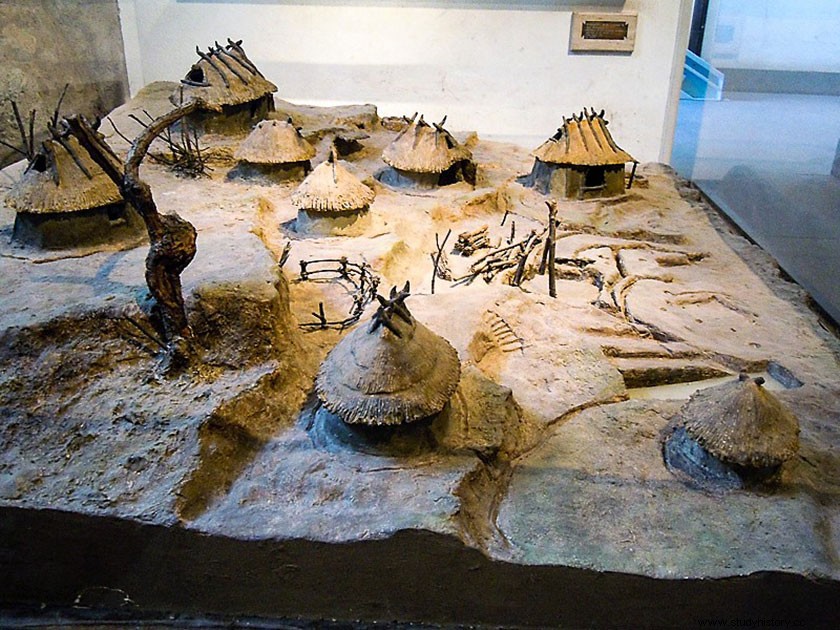
model of the Palatine, (1000 BC.)
The evident thing is that in the 1st century BC, the enormous power that Rome had become, needed some mythical founders who would make the past of the future Roman Empire proud. The great protagonist in this search was Tito Livio , it is evident that he was neither the first nor the last to seek a meaning for the birth of Rome. There were before, like the Greek Hellánico de Lesbos that he was the first, in the 5th century BC, to assign the Greek past to the Romans, something in which the latter were very much in agreement, since they felt a deep admiration for Greek culture. This was followed by other Greek historians such as Timeus of Tauromenium , or Romans like Fabio Pictor, and one practically contemporary to our protagonist, in this case Marco Terencio Varro .
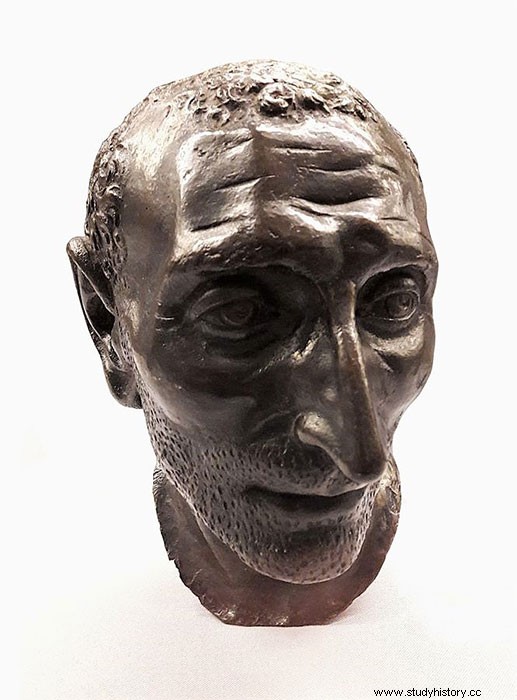
Titus Livy
Evidently all of them were drinking from the traditions, the fables or the stories, that had been generated by the various generations of Romans through the well-known oral tradition. With all of them Tito Livio made the history of the foundation of Rome, and the birth of the Roman culture that we commemorate today. History has had its detractors, who have been adapting it under various views, including prominent Roman historians such as Plutarch, Dio Cassius, or Pliny the Elder, as well as a wide etc. But today Tito Livio is mostly used to learn about the mythical foundation of Rome .
Descendants of the Greeks.
Once again the Iliad and the Trojan War are behind a great mythological adventure. Two characters appear behind the ruins of Troy; in the foreground Aeneas , next to him Antenor , both have in common having been forgiven by the Greeks after the destruction of the city, said forgiveness was thanks to the insistence of both in returning Helena, the wife of Menelaus, to avoid war.
They also have in common the migration that they both start after the end of Troy. Following in the footsteps that the Indo-European peoples took from east to west to colonize the territories of the Italian Peninsula. Although they soon separate their destinies. Antenor, leading the people of the Veneti, heads further north to land on the Adriatic Sea. After which he entered the territory and after expelling the people of the Euganeans, he settled the Veneti in the vicinity of today's Lago di Garda. Suffice it to say that he was hailed as the mythological founder of cities like Padua.
But Aeneas, according to Livy, had more important projects, heading a fleet made up of the surviving Trojans to the Mediterranean. After passing through Macedonia, Carthage and Sicily he landed near present-day Rome. There the people of the Latins were waiting for him, at the head of which was their king, who after seeing the Trojan contingent arrive felt the need to listen to the newcomer. The story that Aeneas carried about the destruction of Troy must have made a dent in the feelings of the king, that people needed a stable settlement and he was willing to give it to them. It is more to seal the pact of union and friendship between Latins and Trojans, he granted him the hand of his daughter Lavinia.
Ascanio was born from the marriage, but storm clouds soon arrived for the Latin people. The Rutulians, one of the indigenous peoples located further south, decide to attack Lavinio, the town founded by Aeneas after his marriage to the daughter of the Latin king. In the combat his father-in-law died, and in this way Aeneas became king of the Latins, after which he expelled the Rutulians of King Turmus from his territories.
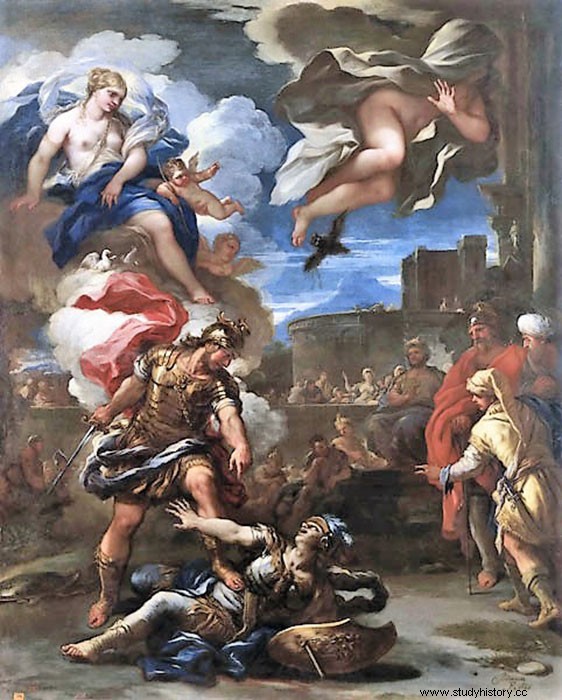
Aeneas victorious before the king of the Rutulians, Turmus
From that moment, Trojans and Latins merge into a single people, the newcomers disappear from history, and the Latins remain as representatives of power around the territories where Rome will end up being founded. But the rival that gave them their victory against the Rutulians presaged serious consequences. In their retreat, the latter decide to seek the support of the Etruscans, at that time the most important people in the Italian Peninsula. The battle between the Latins and the Etruscans took place outside the walls of Lavinio, (this city, if it existed, is thought to be today's Practica di Mare south of Rome). We could well think before the attitude of Aeneas, that he did not want his new city to go through the same evolution as Troy.
In the battle on the banks of the Númico river, Aeneas met his death, but he also found eternal glory as the father of all Latins, the people that will end up shaping the Latin culture throughout the world. Mediterranean.
The war for the flag, Romulus.
Composed of naming two of the main characteristics of Roman culture, few of us will deviate from naming them as heirs of classical Greek culture, of which they were deeply admirers, it only remains to remind the Emperor Hadrian. The other would be its ability to master the art of war, the Empire that dominated the Mediterranean would not have been possible without this second characteristic. Well, with Aeneas the first of them was well defined, the Roman descendants of the Latin people carried the Greeks of Troy in their blood. But they did not comply with the second one, ultimately in the story of Aeneas, even though he was a great warrior, we did not find a born winner; pardoned at Troy, accepted by the Latins, and killed in combat against the Etruscans. Hence, the next task of the Roman historians, with Tito Livio at the head, was to search the mists of memories and traditions for a winner.
The story could be restarted after the same death of Aeneas. To learn how his son Ascanio and his heir achieved peace with the Etruscans and founded the city of Alba Longa, today archaeologically located under Castelgandolfo and a few decades older than Rome itself. Later we would continue to get to know his descendants and how they were creating new cities and undertaking new projects. Until several later generations appear two brothers; Numitor and Amulio .
After the death of his father, the first of them becomes king of the Latins. But Amulio did not agree with this decision and after presenting a battle, he snatches the throne of Alba Longa from his brother, and also decides to end all his male descendants, so that no one could claim the throne. But Amulio spares the life of one of his nieces, Rea Silvia , to make her a vestal priestess given her beauty. She, said position, carried with her the declaration of remaining a virgin, despite which one fine day she appears pregnant, the protagonist of said pregnancy, Mars, the god of war.
Amulio's response was immediate; Rea Silvia is locked up for life and her twin sons, Rómulo and Remo, are thrown into the Tiber River. But the person in charge of said work presumably made a mistake, instead of leaving them in the middle of the current, he deposited them in a backwater of the river. That night the level of the river dropped and the basket remained on the nearby shore, a she-wolf that went down to drink from the river, faced with the desperation of the babies, she prepared to breastfeed them, not only did she save their lives, but the image had just been born most mythical of the birth of Rome, although this had not yet occurred.
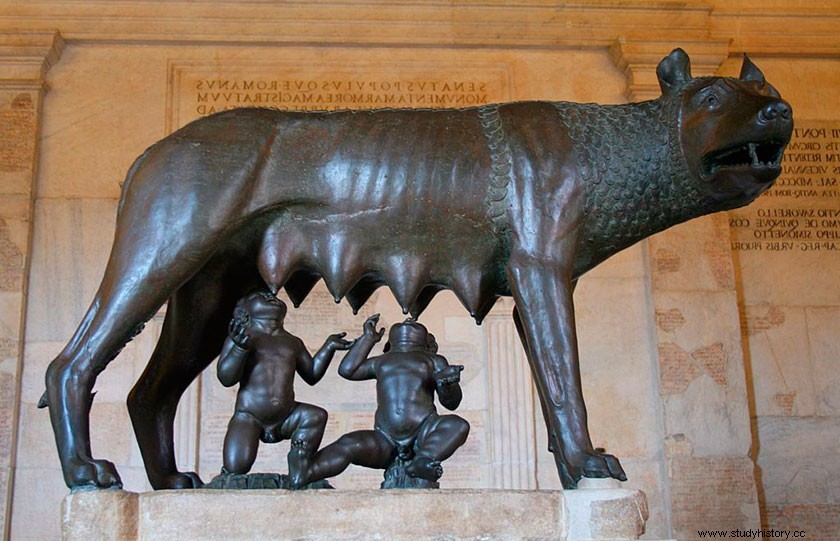
Romulus and Remus suckled by the she-wolf
Fortunately for the children, a shepherd by the name of Faust , he passed by the place, picked up the children and took them to his wife Laurentia , who was the lucky breeder of the future founder of Rome. The children grew up between that home and the nearby woods, where they went to hunt and get some loot from travelers to distribute among the shepherds. Thus they became young people respected by that community of shepherds, settled near the colonies where Rome would one day be founded.
On February 15 they decide to go to the Palatine Hill, where for some time the young people of the place have participated in the Lupercal festival. This consisted of running naked down the hill, with a goatskin leash in hand, in a kind of ritual. There they are marked as booty thieves, in pursuit, although Rómulo manages to escape, Remus is arrested and sent by King Amulio. He did not recognize him, but sent him to his brother Númitor, since according to the apprentices, the thefts had taken place in the latter's territories. As soon as he saw young Remo, he remembered the story in which he had lost his two grandchildren, the age was also coincident, so there was little doubt that Númitor had located one of his grandchildren by chance.
On the other hand Romulus after gathering a large group of shepherds decides to go against King Amulius, upon learning of his brother's plans, Remus decides to come to his aid, thus They killed the impostor king. Before the tumult to silence the spirits, Númitor tells the story of how his brother had come to power and the fate that awaited Romulus and Remus. The people of Alba Longa hail the legitimate king and the young descendants of him, even though the latter had other plans in mind.
Both decide to found a new city, which one day would be the largest of all those founded by the Latins. But the problem was evident, being twins, who had the right to birthright? They decide to leave the decision in the hands of the gods by obtaining the augurs. In this way Romulus begins construction on the Palatine Hill, while his brother Remus chooses the Aventine Hill. The gods soon decide to send their omens, one morning six vultures appear on this last hill, the decision seemed made, but immediately afterwards twelve of these specimens are fluttering on the Palatine hill. The dispute between the brothers and their followers continues, one claims that he was the first, the other that he had more vultures.
In the middle of the dispute, Remus jumps the walls of his brother, this act is understood by Romulus as intolerable, he kills Remus and proclaims that from now on; “everyone who dares to cross my walls will die ”. Rome had just been born, according to what is said it was on April 21, 753 BC. Now if we can say that the Romans had complete the characteristics required of their ancestors. If the father of all Latins was a Greek, the father of all Romans was the son of the God of War himself.
More info:
History of Rome since its foundation books I-III, Tito Livio.
Veni, vidi, vici, Peter Jones, Critical Ed., 2013
